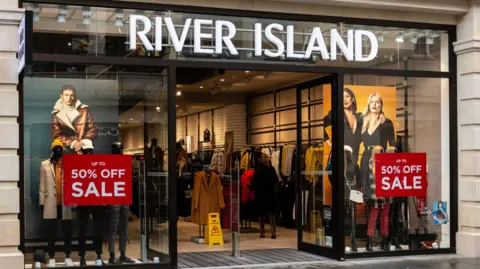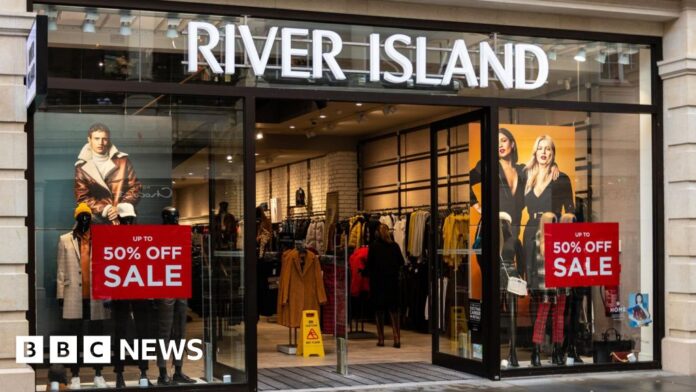Business reporter, BBC News
 Getty Images
Getty ImagesRiver Island has been given the green light to close 33 stores across the UK after the High Court approved the fashion retailer’s restructuring plans.
The High Street brand said a customer shift towards online shopping and higher operating costs had contributed to multi-million pound losses.
It had warned its creditors that it could run short of cash by the end of August if its turnaround proposal was not approved.
As well as closing shops, rents will be reduced at a further 71 branches as part of the plan which, River Island’s chief executive Ben Lewis, said “will enable us to align our store estate to our customers’ needs”.
Negotiations are due to begin with those landlords shortly.
As well as the store closures and rent reductions, about 110 of roughly 950 roles at River Island’s head office will be made redundant, saving an estimated £8.1m.
River Island has 223 stores across the UK and Ireland. None of the Irish shops face closure.
The retailer has already closed seven loss-making shops this year, River Island’s barrister Matthew Weaver KC told the High Court.
He said that unless the restructure was approved, the alternative was insolvency.
Mr Lewis said the company has a “clear transformation strategy” to ensure the business has a future, “and this decision gives us a strong platform to deliver this”.
Charles Allen, an intelligence analyst at Bloomberg, said River Island had failed to keep up with customer tastes which, he said “can be a bit fickle” but the retailer had found itself without “anything striking”.
River Island had also been suffering from issues felt by many UK retailers, such as the shift to online shopping.
“There’s just less business going in shops,” Mr Allen told BBC’s Today programme. He added that rising costs have also been exacerbated by the increase in employer National Insurance Contributions.
‘Shrinking into greatness’
The company employs around 5,500 people and was founded in 1948 under the Lewis and Chelsea Girl brand.
It was rebranded in 1988 as River Island and grew steadily, but in recent years has experienced declining sales, Mr Weaver said.
The company’s most recent accounts revealed a £33.2m full-year loss after sales fell 19%.
Mr Weaver also said that River Island was forecast to be unable to pay its debts from late August or early September, with a projected shortfall of more than £43m.
The company is seeking £54m in funding. Mr Weaver told Friday’s hearing that the company “simply has not been able to reverse” a trend of financial difficulty.
Nick Sherrard, managing director at consultancy Label Sessions, said that while the company has been saved from collapse for now, marketing and creative teams need to get to work to get consumers to care about its products.
“People keep repeating the line that River Island is a much-loved brand. It really isn’t anymore.
“River Island is a much-recognised brand and, while that’s important, it’s not the same thing at all,” he said. “Does someone have a vision for what to do after the cost cutting?
“There are very few examples of companies shrinking into greatness.”
The restructuring will involve closing 33 stores from January 2026, and negotiating with the landlords of a further 71 stores to reduce rents in some cases to zero.
Mr Weaver acknowledged that in some cases, landlords may prefer to regain shop space before the end of leases.
With the restructure, the company is forecasting 1% annual growth for the next five years.
River Island store closures
River Island will close:
- Aylesbury
- Bangor Bloomfield
- Barnstaple
- Beckton
- Brighton
- Burton-Upon-Trent
- Cumbernauld
- Didcot
- Edinburgh Princes Street
- Falkirk
- Gloucester
- Great Yarmouth
- Grimsby
- Hanley
- Hartlepool
- Hereford
- Kilmarnock
- Kirkcaldy
- Leeds Birstall Park
- Lisburn
- Northwich
- Norwich
- Oxford
- Perth
- Poole
- Rochdale
- St Helens
- Stockton On Tees
- Surrey Quays
- Sutton Coldfield
- Taunton
- Workington
- Wrexham




